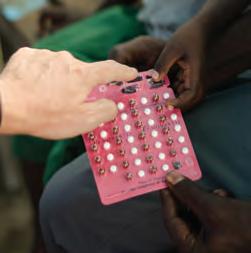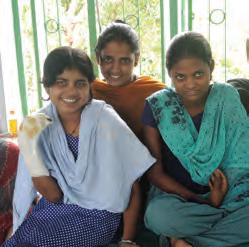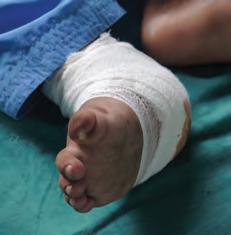
2 minute read
Your message from the CEO
Cure One today! The call for YOU to Cure One! Bless you for Curing One like Anjali
You’ll help provide Multi-Drug Therapy (MDT) to people diagnosed with leprosy. The earlier they can receive the cure, the less likely they are to develop a disability. For a full cure, patients usually need MDT for at least 12 months—but often it’s hard to ensure continuity of treatment. Because a person affected by leprosy may live in a remote area. Or have a disability that makes it hard to travel to a doctor. Or be too poor to seek treatment. Or the stigma of leprosy makes them ashamed to try to get help. All this plays a part in interrupting a course of MDT. But when you commit to Cure One, you’ll ensure a person with leprosy gets the support they need to complete a full course. Thank you to the faithful supporters who have made the commitment to Cure One.
If you’re not yet part of the Cure One community, we urge you to consider the difference you can make. Cure One supporters have been following Anjali’s year-long Cure, Care and Restore journey. Anjali’s parents wept when they found out their beloved daughter had leprosy. 2. Care
Once cured, people still have to deal with the effects of leprosy.
With self-care training, you show them how to help prevent wounds and stop infection that could lead to amputation or permanent disability.
You may also be providing physiotherapy so nerve-damaged hands and feet can function again.
And in severe cases, your support may mean surgery or prosthetic devices to restore mobility and the use of limbs. Her nerve-damaged feet had been badly burned, and her hands had begun to claw. But by God’s grace, Anjali did not lose her feet or hands to the disease. Because someone like you decided to Cure One.
Now we’re looking for others to Cure
1. Cure


One in the next year (see pages 8-9):

3. Restore

People affected by leprosy may be cured and cared for… but they still need to be restored to their families and communities.
Today, the stigma of leprosy lingers. You provide emotional support and counselling for people ostracised or abandoned by family and friends. And you also give them a chance to finish school or learn livelihood skills. It could be raising goats, chickens, opening a shop, or making jewellery or bamboo stools. So they can be self-sufficient and earn their own living.




